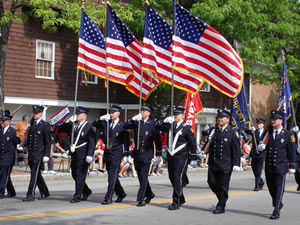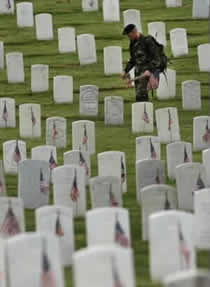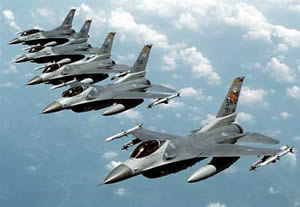
|
He Breaks the Bow and Shatters the Spear
Peace Poetry for Memorial Day 2008
For Sunday June 1, 2008
Lectionary
Readings (Revised Common Lectionary, Year A)
Genesis 6:9–22,
7:24, 8:14–19
Psalm 46 or
31:1–5, 19–24
Romans 1:16–17,
3:22b–31
Matthew 7:21–29
 |
"Measured in blood and treasure, the war in Iraq has achieved the status of a major war and a major debacle."
That bleak assessment isn't from a Muslim extremist or a Bush basher; it's the first sentence of a sixty-page report released April 18, 2008 by the National Defense University called Choosing War; The Decision to Invade Iraq and Its Aftermath. The NDU website describes itself as the "premier center for Joint Professional Military Education and under the direction of the Chairman, Joint Chiefs of Staff." The report directly contradicts more than five years of happy talk by the Bush administration.
In addition to the human and financial costs of the Iraq war (now $2 billion per week, all of which is deficit spending), the report identifies further consequences of our invasion: lost respect among our allies, doubts about our moral leadership in the world because of our occupation of a Muslim country and our treatment of detainees, diversion from the larger war on global terrorism, severe strains on the Army and Marine Corps, and, instead of making us safer, the transformation of Iraq into an "incubator of terrorism." In a tragic paradox, the report describes Iraq as both a "must win" and a "can't win." Numerous faulty assumptions, faulty planning, and an "imperious attitude" on the part of senior leaders have resulted in a "classic case of failure." Despite some recent gains, "the outcome of the war is in doubt."
I believe that in God's eyes every war is a "major debacle" and a "classic failure." We should never admit that wars are inevitable. They don't have to happen. Wars are a failure of political will and moral imagination, a reminder of the horrible economic disparities in the world over which people fight, and a capitulation to fears. As Ken Burns argued in his documentary film The War, some wars might be necessary, but it's wrong to say that they are good or great.
Wars remind us of the deep, very dark and primitive impulses that reside in each one of us as described in the Genesis narrative for this week. A few pages after the creation story that seven times characterized everything as good, we read that the earth grew corrupt and "full of violence" (Genesis 6:11). Adam scape-goated Eve, Cain killed Abel in humanity's first fratricide, then Lamech boasted how he was more violent than Cain because he murdered someone for the slightest insult. In a dire diagnosis of our human condition, Genesis records how God lamented that "every inclination of the thoughts of his heart was only evil all the time" (Genesis 6:5).
Soon after the Civil War ended, many states observed memorial days to honor the 600,000 people slaughtered in that war. In 1967 Congress made "Memorial Day" the official name for the observance. For most people Memorial Day means a barbecue with neighbors, the opening of the local swimming pool, the beginning of summer, or, since 1911, the annual running of the Indy 500. As a Christian, I find it one of the most ambiguous weekends of the year; it's a time of year when many believers (certainly not all) confuse their Christian identity with political patriotism, fidelity to Jesus with support of the state. Those two "citizenships" overlap, but their ultimate concerns are radically different.
 |
I appreciate Memorial Day as an opportunity to honor the people whose lives have been cut short by war. And even though Memorial Day is a distinctly American holiday, as a Christian I try to remember the 200 million people all over the world, mainly civilians, who have died in wars in just the last century. Each slain person was precious to God, their family, and their country. Each death in war diminished us.
But Memorial Day can also remind us of the many ways we sanitize war with euphemisms like "smart bombs" and "collateral damage." In war, the atheist Bertrand Russell observed, we're quick to say how our brave soldiers "gave their lives," but slow to acknowledge that our own soldiers "took" the lives of other human beings. All the political propaganda, all the glorifications of valor, and all the slogans about patriotism should never blind us to the horrors and degradations of war. In war, observed chaplain William Sloane Coffin of Yale, "for every boy turned into a man. . . . there are five human beings turned into animals."
Memorial Day also makes me think about our nation's priorities. Jim Wallis observes in his book God's Politics that government budgets are "moral documents." Having just paid my federal taxes, it bothers me how the government prioritizes the money I send them. According to the National Priorities Project, here's how the government spent my 2007 tax dollars:
42% went to Past and Current Military
22% Health
10% Interest on Non-Military Debt
9% Anti-Poverty Programs
4% Education, Training & Social Services
4% Government & Law Enforcement
3% Housing & Community Development
3% Environment, Energy & Science
2% Agriculture, Commerce and Transportation
1% International Relations
In 2005 the United States accounted for 48% of the entire world's military spending — which is to say that our one country nearly spent more on the military than the rest of the world combined. Our Department of Defense says that America deploys 254,788 military personnel (double that number if you include dependents) to at least 725 military bases in 153 countries. Our own country is home to 969 separate bases in all fifty states. By these budgetary metrics, the United States prioritizes war like no nation on earth.
In the psalm for this week, the Hebrew poet worships God who "makes wars cease to the ends of the earth; / he breaks the bow and shatters the spear, he burns the shields with fire" (Psalm 46:9). That vision of God's priorities for peace stands in sharp contrast to humanity's propensity for war. The psalmist's peace poetry reminds me of two prophetic Christians, one ancient and one modern, who demonstrated how the priorities of church and state, throne and altar, Caesar and God, are as different as parallel universes traveling in opposite directions.
When the emperor Theodosius (347–395) slaughtered 7,000 people in Thessalonika "most unjustly and tyrannically," bishop Ambrose of Milan (340–397) physically prevented him from entering his church. The Syrian bishop Theodoret (c.393–466) recorded the drama in his Ecclesiastical History (V.17-18): "You must not be dazzled by the splendor of the purple that you wear," thundered Ambrose to Theodosius. "How could you lift in prayer hands which are stained with the blood of such an unjust massacre? Go away, and do not add to your guilt by committing a second crime." Emperor Theodosius "submitted to the rebuke, and with many tears and groans returned to his palace." Ambrose later restored him after thirty days of public penance.
 |
The Catholic priest and peace activist Phil Berrigan (1923–2002) was arrested more than 100 times and served a total of 11 years in prison for acting on his conviction that the gospel of Jesus constituted a higher law than the civil laws he disobeyed: "It's spelled out in Scripture, it could not possibly be more clear. It's spelled out in the wisdom of Isaiah, with its injunction to beat swords into plowshares and to learn war no more. To be acceptable to God, it says, we must forsake our weapons, destroy them, live as brothers and sisters in peace and love. Christians do not hate, Christians do not kill, Christians love their enemies. It's difficult. . . . But I do know that being a Christian is about non-violence. It's about justice. It's about being outraged at the way we destroy each other."
For further reflection
* See Chris Hedges, War is a Force That Gives Us Meaning (2002) and Andrew Bacevich, The New American Militarism; How Americans are Seduced By War (2005).
* Do you think the United States is more militaristic than other countries?
* What are you feeling and thinking about our five years in Iraq?
* Consider this conundrum: Jesus calls believers to do something that states and governments cannot and should not do: to love our enemies and to place the interests of others before our own interests.
Image credits: (1) DemocratAndChronicle.com; (2) Smoke on the Water blog; and (3) Schema-root.org.





